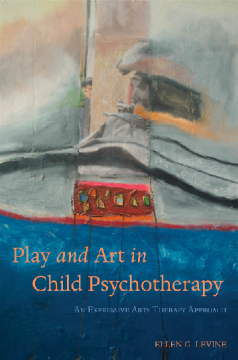
Additional Information
Book Details
Abstract
Ellen G. Levine draws on her extensive experience in clinical settings to present a series of case studies that demonstrate how art-making and imaginary play can provide a space for children to metabolize their experiences. Each study is followed by an arts-based research discussion of the themes that emerged in the clinical sessions and the basic principles that were followed in the work with the child or family. The model of expressive arts therapy is used to explore the questions that arise from the cases, which range from issues of war trauma, to anger, grief, and the impact of mental illness in the family.
This comprehensive guide to the use of play and art in working with children and parents will be of interest to students and practitioners in the fields of expressive arts therapy and psychotherapy, in addition to anyone working with children in disciplines such as psychology, social work and psychiatry.
Based on decades of experience as an artist, researcher, educator, and child psychotherapist Ellen Levine, author of many of the leading texts giving shape to the ever-emerging expressive arts therapy field, has created her culminating and most significant work in Play and Art in Child Psychotherapy. Among the many innovative features of the book is its unique contribution to art-based research emphasizing how the therapist's artistic reflection on sessions generates different ways of understanding, all influenced by the qualities of the various media used. Those wanting to see what art as research looks like, will find inspiration in how Levine's practitioner research expands essential expressive arts therapy experiences as a way of understanding. She demystifies research, making it inseparable from elemental and ongoing practice, helping us "play with" problems, discover the "beauty that sustains," and ultimately return insights to the work where there is always more to see. Ellen Levine's writing looks and feels like expressive arts therapy. It transcends linear, hierarchical, and formulaic schemes, modeling how art happens organically in every aspect of the experience from the client's exploration to the therapist's reflection and the overlapping space of imagination where they create together and make new and unexpected worlds.
Shaun McNiff, University Professor, Lesley University, and author of Art Heals, Integrating the Arts in Therapy, Art-Based Research and Imagination in Action
Ellen G. Levine is Co-Founder and Faculty member of ISIS-Canada, a Senior Staff Social Worker at the Hincks-Dellcrest Centre for Children's Mental Health, and a core faculty member of the European Graduate School, Switzerland. She has been working with children and parents in a clinical setting with the arts and play for over 30 years and is co-author of Art in Action: Expressive Arts Therapy and Social Change and Principles and Practice of Expressive Arts Therapy: Toward a Therapeutic Aesthetics, both published by Jessica Kingsley Publishers. She lives in Toronto, Canada.
